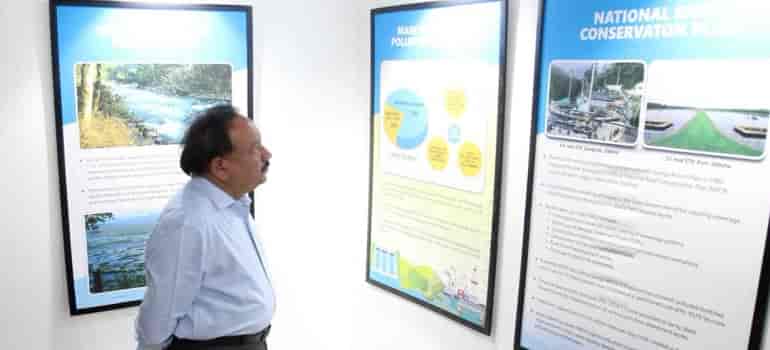
India is in the forefront of handling climate change and global warming for the whole world, with the country making rapid progress vis-a-vis various green energy efforts, Union Minister for Environment and Science and Technology Harsh Vardhan said on Saturday.
“…in all these activities which will directly contribute to mitigation and adaptation efforts and handling climate change and global warming for the whole world, India’s example is being emulated and shall be emulated and it will be an inspiratory example for rest of the whole world,” he said.
The country has been able to fulfil a significant portion of its promises to the whole world in terms of reducing emissions and “handling our nationally determined contributions” much before the expected deadline, he said.
“We are probably one of the few countries which are moving so fast, so speedily and then for all our future targets…for having 40 per cent share of clean energy in our energy requirements by 2030, having all those electric vehicles, 100 per cent electric vehicles by 2030, I think in all these and then BS IV to BS VI by 2020, in all these activities…,” he said.
Observing that India is leading from the front in handling environmental concerns, he said the mission and the initiatives that Prime Minister Narendra Modi launched before the whole world at the Paris global warming and climate change meeting at COP are being appreciated all over the world.
He also cited the example of the country taking the initiative in launching the international solar alliance.
Vardhan was speaking after inaugurating the ‘Atal Complex for International Training Centre for Operational Oceanography’ (ITCOocean), which provides training in operational oceanography.
The centre was set up in the premises of INCOIS here.
It was established after the union government decided in 2013 to contribute by setting up a permanent training centre when the Intergovernmental Oceanographic Commission (IOC) of UNESCO requested its members to finance and undertake capacity building programs.
The Minister said the country’s early tsunami warning system is the best in the world, matching the capabilities of the best in the world or even surpassing their capabilities.
He appreciated the vision of the leaders in the past in creating the institution.
“Because anything, if it is not backed up by research, training, preparing the future generations for the new revolution that have to emerge, it is in a way incomplete.
This is thanks to the vision of the leaders in the past also who thought of creating this institution,” he said.
UNESCO wanted a monetary contribution, but “we in India had the vision to say that we not only believe in monetary contribution, but we believe in creation of institution,” he said.
He praised the wisdom of naming the building after former Prime Minister Atal Bihari Vajpayee.
While Vajpayee added ‘Jai Vignan’ to the slogan of ‘Jai Jawan, Jai Kisan’ given by former Premier Lal Bahadur Shastri, Vardhan said he tried to add a small component of ‘Jai Anusandhan’.
Noting that India has emerged to great levels in science and technology, he said India is among the top scientific nations in the world on major parameters.
“We are something like sixth in terms of our scientific publications in the whole world,” he said.
In early tsunami warning systems, India never gave any false warning like many other developed countries, he said.
There are 1207 institutions like CSIR (Council for Scientific and Industrial Research) in the whole world and India is ranked ninth, he said.

